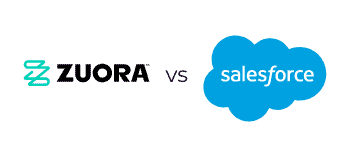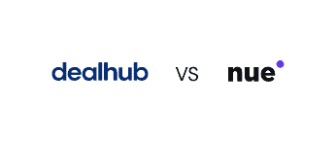Introduction
Compare Zuora CPQ and Salesforce CPQ
CPQ software streamlines sales operations by automating the configure-price-quote process and generating compliant contracts and accurate proposals. Salesforce CPQ and Zuora CPQ are competitors in the market, offering comprehensive solutions to simplify the sales process.
Zuora CPQ is a managed package for Salesforce. It enables efficient quoting of subscriptions, products, services, and bundles. It manages recurring billing, even for the most complex product bundles. It also provides powerful product configuration capabilities, allowing customers to quickly configure and price products for quotes and contracts for new and existing subscribers.
Zuora also offers a connector for Salesforce CPQ, which allows users to seamlessly link their subscription billing backend with the front end of your CPQ. This powerful integration will automate and streamline the contract and quote processes so sales teams can create accurate subscriptions without extra effort.
Salesforce is the CRM industry gold standard, and its CPQ solution is a part of its wide array of product offerings. Salesforce also offers Salesforce CPQ + Billing for customers who need a more comprehensive solution to manage subscription billing and CPQ operations with Revenue Cloud. This solution is great for companies with more complex product bundling and pricing needs, as the two solutions are deeply integrated for maximum efficiency.
Product Overview
Overview of each CPQ Solution
Zuora CPQ and Salesforce CPQ are viable options for a CPQ platform, but they also use significantly different data models (and have different approaches to CPQ in general).
Defining Zuora CPQ
Zuora CPQ is designed to simplify the complexity of subscription-based pricing and quoting, making it a powerful solution for businesses operating in recurring revenue models. It enables sales teams to configure personalized subscription offers, apply usage-based pricing, and manage contract changes such as upgrades, downgrades, and renewals—all within a single platform.
One of Zuora CPQ’s standout capabilities is its seamless integration with Zuora Billing, allowing businesses to connect quoting with invoicing, payments, and revenue operations. This integration ensures a smooth transition from quote to cash, eliminating data silos and enhancing financial accuracy.
Additionally, the platform supports multi-dimensional pricing, discounting, and product bundling, giving companies the flexibility to structure offers that match customer needs. By providing real-time insights into subscription metrics, Zuora CPQ helps sales teams make informed decisions and optimize pricing strategies for long-term growth.
Defining Salesforce CPQ
Salesforce CPQ is a comprehensive solution organizations use to automate product configuration, pricing, and quoting processes. As part of Salesforce’s ecosystem, users enjoy the same UI and data models that come with its larger suite of tools, as well as access to third-party integrations from members of its partner network.
Salesforce CPQ is an ideal solution for companies that want a customizable product configuration, pricing, and quoting process they can build it from the ground up to suit their unique needs. Custom workflows can be built to integrate with existing back-end systems.
Salesforce defines itself as a CPQ solution for small, medium, and large-sized businesses. And while there are small businesses using its products, its more likely to be favored by large companies due to its customizability and advanced features.
Product Features
Comparison of Key Features
Salesforce and Zuora offer standard CPQ functionality out-of-the-box, including product catalogs, configurations, price rules, and more. They are both used by SaaS and subscription-based businesses to manage quoting and efficient selling.
Zuora is purpose-built with CPQ features for SaaS and subscription businesses. It enables sales teams to configure dynamic subscription offers, apply multi-dimensional pricing models, and manage recurring revenue scenarios like upgrades, renewals, and cancellations—all while ensuring billing accuracy. With seamless integration into Zuora Billing, the platform eliminates data silos, synchronizing quotes with invoicing and revenue operations for a smooth quote-to-cash process.
Salesforce CPQ has subscription management features as well. Its robust pricing and discounting capabilities include co-terming, renewal management, and automated approvals. The price waterfall feature ensures that pricing adjustments—such as list price, volume discounts, partner margins, and promotions—are applied in a structured sequence, maintaining profitability and transparency. Additionally, Salesforce CPQ simplifies subscription and contract management with co-terming options that align contract end dates for seamless renewals and billing.
Here’s a breakdown of each product’s features:
| Zuora CPQ | Salesforce CPQ |
|---|---|
| A centralized platform for managing subscriptions, recurring billing, revenue activities, proposals, and quotes | Microservices architecture with Sales Cloud and Revenue Cloud integration. |
| Native integration with Salesforce and third-party integrations through Zuora’s low-code SDK and API. | Hosted on Sales Cloud for CRM and selling activities and part of Revenue Cloud for proposal generation, invoicing, and billing capabilities. |
| Fast implementation, especially if there is no custom code needed. Small businesses and freelancers can begin using Zuora quickly. | IT implementation takes an average of 6-9 months. |
| Product-specific guided selling rules ensure sellers match the right product configurations and pricing rules with their customers. | Pre-built guided selling capabilities are available, but more intricate workflows require custom coding. |
| Scalable for subscriptions, but requires additional software (such as Salesforce CPQ) for other types of proposals. | Enables subscription, product, and service sales and bundling. |
| Customer-specific discounting, pricing, upselling, cross-selling, and contract renewal functionality for subscription businesses. | Each price quote is delivered as an attachable file, and any alterations necessitate a new version of the document. |
| Additional features available on a case-by-case basis. | Additional features and licenses available for added costs. |
| New subscriptions and subscription changes are automated for an optimal customer experience. | Customer communication within the Salesforce platform and its partners (like Slack). |
| Customer-specific sales discounting and pricing features that change with subscriptions. | Subscription management and complex billing capacity for purchase orders, one-off projects, and client invoices. |
| Insights into customer lifetime value, average deal size, revenue per customer, and other financial impact metrics to help businesses invest in the customer segments that generate the most revenue. | Detailed reporting analytics for customized pricing strategies and discount structures. CRM integration for deeper customer analytics. |
| Supports multi-currency price quotes with localized pricing for international companies. | Supports multi-currency quoting. Users can define currency conversion rates, apply localized pricing, and ensure accurate quotes for international customers. |
| Native support for new deals and quote management for recurring revenue, consumption, and many other pricing strategies. | Full-cycle quote-to-cash automation with Revenue Cloud. |
| Web-based platform. | Web and mobile (iPhone and Android) platforms. |
| 24/7 chat (live rep) FAQ Knowledge base Developer community Zuora University | Phone support Knowledge base Chat FAQs/Forum Online support Self-service training (Trailhead) In-person training Documentation |
Customer Size
Ideal Customer Profiles
Zuora and Salesforce both serve companies in the medium to large enterprise categories.
Zuora’s focus on subscription businesses and its wide selection of integrations make it an ideal choice for businesses that need to create complex and unique quotes.
On the other hand, Salesforce CPQ is mainly used by larger enterprises with more complex product catalogs and greater pricing rule complexity. Additionally, its integration with the larger Salesforce suite of products makes it even more attractive for large businesses that need to manage sales opportunities from one platform.
That said, Zuora CPQ is part of a complete billing and subscription management platform that includes billing software, revenue management, a payment processor, and analytics, making it perfect for enterprise SaaS companies managing complex subscriptions. It just won’t work as nicely with manufacturers, suppliers, or other non-recurring-revenue models.
Pricing
Breakdown of Pricing Options
Zuora and Salesforce CPQ also differ on pricing. Each company has a microservices architecture, making pricing custom to a certain extent. But Salesforce has a few price points mentioned on its website while Zuora requires prospective users to talk to sales for a custom quote.
Salesforce starts at $75 per user per month, making it one of the most expensive CPQ solutions on the market. It also has a subscription-management feature that starts at an additional $25 per user per month.
Zuora CPQ offers tiered pricing on the Salesforce AppExchange, but there is no specific pricing disclosed on its site. In general, though, Zuora is well-known for being on the high end of the pricing spectrum and its monthly price point is comparable to Salesforce’s—microservices accounted for.
| Zuora CPQ | Salesforce CPQ | |
|---|---|---|
| Product Pricing | Talk to sales | CPQ: $75 per user per month (billed annually) CPQ Plus: $150 per user per month, billed annually CPQ + Billing Growth: Contact sales CPQ + Billing Plus: Contact sales |
| Implementation Fees | High development costs at the enterprise level. | Ongoing implementation fees for custom-coded functionality and system integration. |
| Additional Licenses | Additional license fees for revenue management, billing software, payment processing, and Zuora Monetization Platform. | Additional license fees for e-sign, contract management, buyer engagement tracking, plus hidden licensing costs. |
Not included in either pricing structure is the additional customization and development costs needed to get the CPQ platforms up and running. Depending on the complexity of the project, these costs can range from a few thousand dollars to tens of thousands.
IT costs for Salesforce can escalate quickly when transitioning between systems or implementing a new one. While companies with an existing Salesforce instance will experience lower costs, those starting fresh or moving from a non-Salesforce platform will likely incur additional IT implementation expenses.
It’s difficult to estimate the exact pricing for each product, making the specific use case a bigger deciding factor when evaluating Zuora CPQ vs. Salesforce CPQ.
Summary
Considerations for Choosing Between the Two Solutions
Zuora CPQ and Salesforce CPQ both offer powerful tools to streamline product configuration, pricing, and quoting, making them valuable solutions for businesses looking to automate their sales processes. Both platforms support complex pricing models, contract management, and integration with broader revenue operations systems, ensuring accuracy and efficiency in quote generation. They also help businesses reduce manual errors, accelerate sales cycles, and provide better visibility into customer contracts and subscription terms.
However, key differences set them apart. Zuora CPQ is specifically designed for subscription-based businesses, offering deep integration with Zuora Billing to manage recurring revenue, tiered pricing, usage-based pricing, and contract modifications like upgrades and renewals. In contrast, Salesforce CPQ provides a more broadly applicable CPQ solution, excelling in standard B2B sales workflows within the Salesforce ecosystem. Ultimately, the right choice depends on a company’s business model—Zuora CPQ is ideal for subscription-driven organizations, while Salesforce CPQ offers flexibility for businesses with both one-time and recurring sales models.
FAQs
Frequently Asked Questions
Zuora CPQ is a CPQ platform purpose-built for subscription-based businesses. For organizations using a recurring revenue model (e.g., subscription, usage-based pricing, etc.), Zuora CPQ offers a customer-focused solution for quote-to-cash processes. It is also highly customizable and can scale with an organization’s needs.
Salesforce CPQ provides businesses with a comprehensive quoting tool that integrates seamlessly into the Salesforce platform. This allows businesses to manage the sales process and quickly generate quotes from one platform. It also offers robust customization options, making it easier for companies to tailor the system to their needs. Additionally, Salesforce CPQ has a large developer community that can help implement the solution or customize it further.
Whether or not Salesforce CPQ is the right CPQ for your business depends on your needs. It may be worth considering if you already use Salesforce Sales or Revenue Cloud. The advanced features, scalability, and customizability make it a good option for larger businesses. However, less expensive solutions that are easier to implement without extra development resources are available.
Salesforce CPQ is hosted within Sales Cloud, but is not a part of the core product. Salesforce’s CPQ solution is designed to complement existing tools and help sales teams automate quote generation, pricing and discount management, and order processing. It also helps streamline approval processes for larger transactions.

Andrew is a professional copywriter with expertise in creating content focused on business-to-business (B2B) software. He conducts research and produces articles that provide valuable insights and information to his readers.








